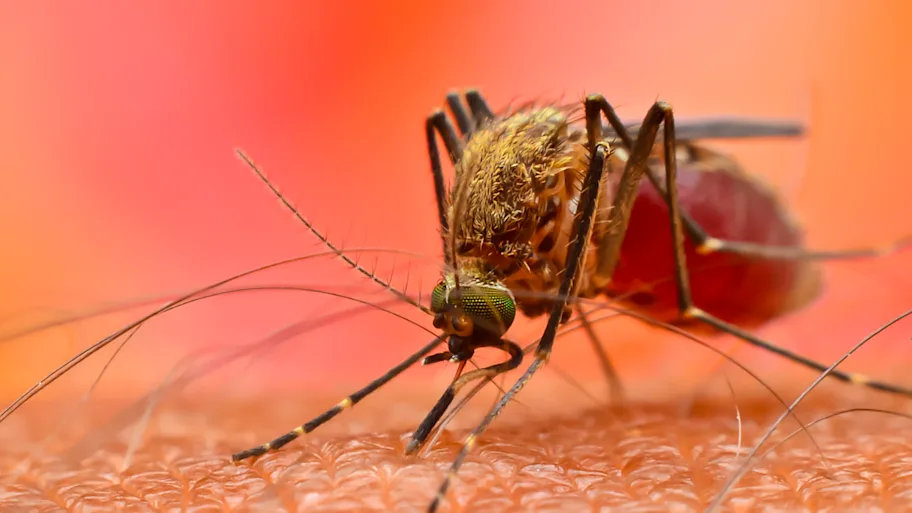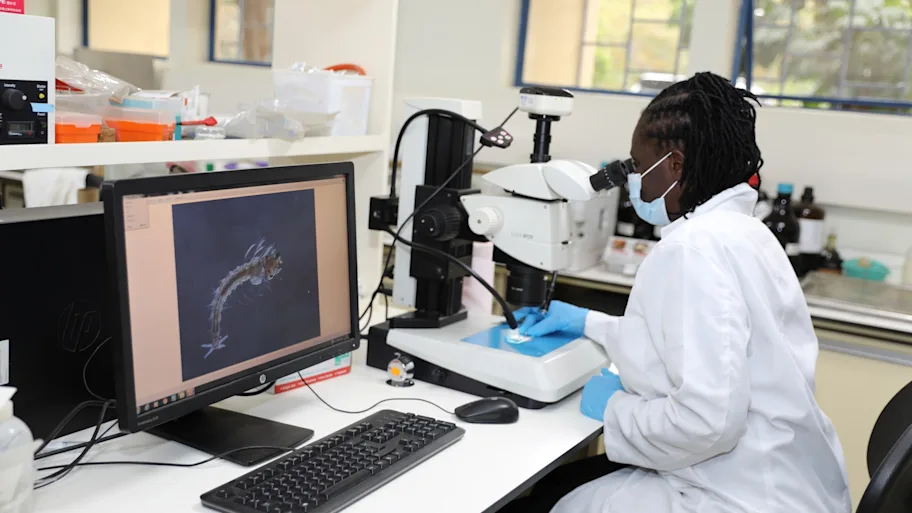
- Science news
- Featured news
- Fighting malaria by manipulating the amount of serotonin mosquitos obtain from blood meals
Fighting malaria by manipulating the amount of serotonin mosquitos obtain from blood meals
By Maryam Clark and Mischa Dijkstra, science writers

Image credit: Somboon Bunproy / Shutterstock.com
A new study shows that by feeding blood containing high levels of the neurotransmitter serotonin to female invasive city-dwelling mosquitos (Anopheles stephensi), we can decrease the mosquitos' flight speed, and reduce their motivation to seek out a second blood meal. This suggests that we could ultimately prevent the mosquitos' transmission of malaria, by manipulating the amount of host serotonin that mosquitos normally obtain from their blood meals.
Many people have heard of serotonin as a signaling molecule in the human brain that affects our mood. But across the animal kingdom, serotonin signaling is crucial for regulating a vast range of other functions, for example blood pressure, heart rate, nausea, and the rate of food passage in the gut. Now, a study in Frontiers in Physiology shows how we could take advantage of the pivotal role of serotonin in physiological pathways across unrelated species, to disrupt the transmission of malaria. The results suggest that by increasing the amount of serotonin that mosquitos ingest with mammalian blood, we can change the mosquitos' behavior to make them less efficient vectors of malaria parasites.
► Read original article► Download original article (pdf)
“We show that the flight speed of female Anopheles stephensi mosquitos and their tendency to seek out a second blood meal increases after feeding on malaria-infected mouse or human blood – depleted in serotonin, with only 0.15 micromoles per liter – compared to when they are fed blood with 15 micromoles serotonin per liter, the level typical of healthy, uninfected humans," said corresponding author Dr Shirley Luckhart, a professor at the Department of Entomology, Plant Pathology and Nematology, and the Department of Biological Sciences of the University of Idaho, and expert on arthropod-borne infectious diseases.
"This suggests that ingestion by mosquitos of infected blood depleted in serotonin favors malaria parasite transmission, while ingestion of blood from healthy hosts rich in serotonin inhibits it."
Emerging threat in urban Africa
Anopheles stephensi is one of the few species of malaria-transmitting mosquitos that thrive in cities. Originally native to Asia, it has spread to Djibouti, Sudan, and Ethiopia over the last decade. The World Health Organization (WHO) considers this invasive species to be "a major threat to malaria control and elimination in Africa", which puts urban populations at significantly greater risk.
► Read original article► Download original article (pdf)
Luckhart and colleagues from the University of Idaho and the University of Washington infected female A. stephensi with human and rodent malaria. To this end, they fed the mosquitos human blood from artificial culture, infected with the human malaria parasite Plasmodium falciparum, or blood from live mice infected with the mouse malaria parasite Plasmodium yoelii. Blood from mammals with severe malaria is typically strongly depleted in serotonin. As a control, the authors fed mosquitos human or mouse blood with healthy levels of serotonin. They then compared fertility, lifespan, flight behavior, and the likelihood of seeking out a second blood meal.
The timing of taking a second blood meal – feeding on a second person after feeding on someone with malaria – is critical to transmission of the disease. Once in the mosquito midgut, malaria parasites multiply in cyst like-structures to form 'sporozoites' that migrate to the salivary glands, ready to be injected into the next person when the mosquito feeds again. These behaviors by the parasite are thought to be regulated by serotonin signaling between the brain and the gut of the mosquito.
Serotonin signaling found in many of mosquito tissues
“Here we carried out immune-staining for serotonin in A. stephensi tissues, which revealed that serotonin-expressing neurons innervate the mosquito's midgut, thorax, and several areas of the brain,” said Luckhart.
“This finding suggests the existence of a brain-to-gut channel of communication in the mosquito which likely involves signaling by ingested serotonin originating from the host, locally in these tissues as well as throughout the mosquito body.”
Such gut-to-brain signaling is also seen in other animals, from nematodes to humans, and unraveling its pathways in the mosquito host could thus provide a promising means of insect-targeted intervention to prevent the spread of malaria.
Promising new avenue for fighting malaria
Luckhart’s next experiments, with her collaborators at the University of Washington and Virginia Tech, aim to track the fate of ingested serotonin in the mosquito, and to how its brain-to-gut communication may be manipulated to block transmission of the parasite.
“It’s clear we need more effective interventions to control malaria, given the growing levels of insecticide resistance and increasing numbers of parasites from nonhuman primates that are capable of jumping across species into humans,” said Luckhart. “We aim to block serotonin signaling in the mosquito host, using chemical or transgenic strategies, to prevent this enhanced transmission from happening.”
REPUBLISHING GUIDELINES: Open access and sharing research is part of Frontiers’ mission. Unless otherwise noted, you can republish articles posted in the Frontiers news blog — as long as you include a link back to the original research. Selling the articles is not allowed.






